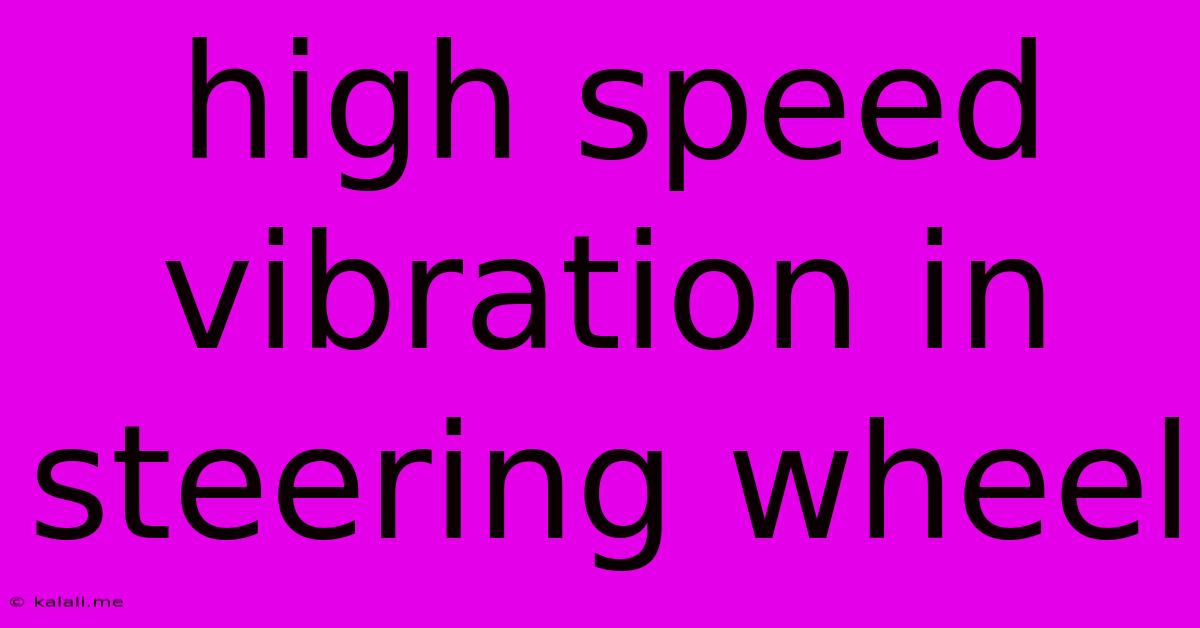High Speed Vibration In Steering Wheel
Kalali
May 24, 2025 · 3 min read

Table of Contents
High-Speed Vibration in Steering Wheel: Causes and Solutions
Feeling a significant vibration in your steering wheel, especially at high speeds? This isn't just annoying; it can be a sign of a serious underlying problem with your vehicle. Ignoring it could lead to further damage and even safety hazards. This article will explore the common causes of high-speed steering wheel vibrations and suggest potential solutions. Understanding the root cause is crucial for a safe and comfortable driving experience.
Common Causes of High-Speed Steering Wheel Vibration
Several factors can contribute to noticeable vibrations in your steering wheel at higher speeds. These can range from relatively minor issues to more serious mechanical problems requiring professional attention. Let's delve into the most frequent culprits:
1. Wheel Balance Issues: This is often the most common cause. If your wheels are out of balance, the weight distribution is uneven, causing them to wobble at higher speeds. This imbalance translates directly to vibrations felt in the steering wheel. Regular wheel balancing is crucial preventative maintenance.
2. Tire Problems: Worn or damaged tires can significantly impact steering wheel vibration. Uneven tire wear, cupping (irregular wear pattern), or bulges in the tire sidewall can all contribute to vibrations. Inspecting your tires regularly for wear and tear is essential. Look for signs of uneven wear, bulges, or damage.
3. Worn or Damaged Suspension Components: Components like ball joints, tie rod ends, and control arm bushings play a crucial role in your vehicle's suspension system. Wear and tear in these parts can lead to vibrations felt in the steering wheel, especially at higher speeds. A thorough suspension inspection by a qualified mechanic is vital in diagnosing these issues.
4. Brake Rotor or Caliper Problems: Warped brake rotors or a seized brake caliper can also cause vibrations felt in the steering wheel. A warped rotor will create an uneven braking surface, leading to pulsating vibrations, particularly when braking. A seized caliper will apply uneven pressure, causing a pull or vibration. Inspecting your brake system for damage or wear is critical for safety.
5. Drive Shaft Problems: Issues with the drive shaft, such as imbalance or damage to the universal joints (U-joints), can transmit vibrations to the steering wheel, particularly at higher speeds. This is often accompanied by other symptoms, such as clunking noises or vibrations throughout the vehicle. Professional inspection of the drive shaft is necessary for accurate diagnosis.
6. Steering Column Issues: Although less common, problems within the steering column itself can also result in vibrations. This could be due to worn components or damage within the column. A specialized mechanic is often required to diagnose and repair steering column problems.
Diagnosing and Addressing the Vibration
Pinpointing the exact cause of high-speed steering wheel vibration requires a systematic approach. Here's a suggested process:
- Visual Inspection: Begin by carefully inspecting your tires, wheels, and suspension components for any visible damage or wear.
- Test Drive: Take your vehicle for a test drive, paying close attention to the speed at which the vibration begins and its intensity. Note if the vibration changes with braking or turning.
- Professional Diagnosis: If the cause isn't immediately apparent, it's crucial to seek professional help from a qualified mechanic. They have the tools and expertise to accurately diagnose and repair the underlying problem.
Preventing Future Vibrations
Regular maintenance is key to preventing steering wheel vibrations. This includes:
- Regular Wheel Balancing and Alignment: Get your wheels balanced and aligned regularly, typically every 6 months or 6,000 miles.
- Tire Rotation and Inspection: Rotate your tires and inspect them for wear and tear at each oil change.
- Regular Suspension Inspection: Have your suspension system inspected during routine maintenance checks.
- Brake System Inspection: Inspect your brake system regularly for wear and tear, paying close attention to the rotors and calipers.
Ignoring high-speed steering wheel vibrations can lead to more serious issues and compromise your safety. By understanding the potential causes and taking preventative measures, you can ensure a smooth, safe, and vibration-free driving experience. Remember, regular maintenance is your best defense against these problems.
Latest Posts
Latest Posts
-
Replace Double Pane Glass In Door
May 24, 2025
-
Words That Repeat Letters Like Tutu
May 24, 2025
-
How Old Are The Ponies In Friendship Is Magic
May 24, 2025
-
Grep Standard Input Binary File Matches
May 24, 2025
-
What Size Is A 6mm Drill Bit
May 24, 2025
Related Post
Thank you for visiting our website which covers about High Speed Vibration In Steering Wheel . We hope the information provided has been useful to you. Feel free to contact us if you have any questions or need further assistance. See you next time and don't miss to bookmark.